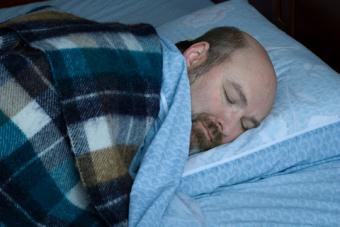
The circadian rhythm is the body's natural clock for sleeping and waking cycles. A healthy circadian rhythm ensures that you are able to get enough sleep and wake without feeling tired. If you find yourself experiencing problems with your sleep, you could have a disruption in your circadian rhythm.
Circadian Rhythm Disorders
A circadian rhythm is much like a 24-hour clock in your body that regulates certain physical, mental and behavioral changes. A group of nerve cells in the brain which respond to light, darkness, and other environmental factors and natural changes in the body, is in control of this internal clock. When a change (such as leaving a darkened room for a lighted one) occurs, it might cause a person to be more alert or more tired, depending on the time of day and the signal that is sent to the brain.
When the circadian rhythm is disturbed, the body will attempt to adjust, and bring it back to its normal state. However, certain circumstances will inhibit a person's natural rhythm. The most noticeable symptoms of having an altered circadian rhythm include feeling tired throughout the day, a lack of alertness, and, paradoxically, difficulty falling asleep.
Jet Lag
Symptom of jet lag, sometimes called rapid time zone change syndrome, include the following:
- Change in appetite
- Feeling drowsy during the day
- Headaches
- Insomnia
- Lack of daytime alertness
- Muscle soreness
This disorder occurs in people who fly between time zones. This is particularly difficult when traveling west, because going to sleep earlier than your body needs to is difficult. When traveling east, jet lag is less of a problem, because staying awake until you are acclimated to the new time zone is easier to do.
Delayed Sleep Phase Syndrome
Symptoms of delayed sleep phase syndrome include the following:
- Difficulty waking in the morning
- Inability to fall asleep until the very late night
- More productive during the late night
- Nighttime alertness
This disorder, which can earn a person the nickname of being a "night owl," causes a person to be awake until very late at night. Waking in time to go to school or work can be difficult for people with this sleep disorder, yet they tend to be very productive in the late night. Teens and young adults are especially prone to this particular disruption in their circadian rhythm, with approximately seven percent of young people being affected. It is believed that this syndrome is caused by genetic factors that affect the part of the brain that controls the circadian rhythm.
Shift Work Sleep Disorder
The follow symptoms can signify shift work sleep disorder:
- Difficulty in maintaining a social life
- Fragmented sleep
- Lack of alertness while working
- Not getting enough sleep
Working at night, when most people sleep, can keep the circadian rhythm off kilter and prevent proper sleep patterns. Changing shifts frequently from day to night can also cause this problem. It is possible to adjust to working night shifts, but it requires sticking to a regular sleep pattern, which will help establish a new circadian rhythm.
Advanced Sleep Phase Syndrome
Symptoms of advanced sleep phase syndrome include the following:
- Excessive sleepiness early in the evening
- Insomnia
- Waking in the early morning
People with this condition fall asleep early, only to wake in the middle of the night. This disorder does not necessarily prevent a healthy duration of sleep, but rather causes a person to be on a different schedule than most other people. Being excessively sleepy early in the evening and waking during the small hours of the night can prevent someone with this syndrome from having a social life and might be disruptive to other members of their household. This syndrome primarily affects elderly people.
Non 24-Hour Sleep Wake Disorder
Also known as non-entrained circadian rhythm sleep disorder, non-24-hour sleep wake disorder has the following symptoms:
- An inability to maintain a consistent sleep schedule
- Excessive daytime sleepiness
- Insomnia
This condition causes a shift in the sleep/wake cycle that is characterized by intermittent insomnia, early waking, and late falling asleep. The result can be an inconsistent sleep schedule that causes excessive fatigue. Non-24-hour sleep wake disorder primarily affects people who are blind, because they cannot perceive light. Exposure to light helps the brain regulate the circadian rhythm. This disorder often goes undiagnosed but can be debilitating.
How to Regulate Your Rhythm
Circadian rhythm is highly individualized. The most important step in regulating your sleep/wake cycle is to keep a consistent schedule. Some people with circadian rhythm disorders may also benefit from sleep disorder treatment. Try these tips for regulating your sleep patterns:
- Try to fall asleep and wake up at the same time every day, including weekends.
- Eat your last meal several hours before bedtime, and try to have breakfast at the same time every morning. Also, avoid stimulants and alcohol close to bedtime.
- Using a light box can help stimulate the effect that sunlight has on the body, and promote wakefulness.
- Try Chronotherapy. This therapy resets the sleep/wake cycle by shifting bedtime and and waking time by three hours each day.
- Effective stress management is an important part of developing developing better sleep hygiene.
- Regular exercise helps the body to keep a healthy sleep cycle, especially exercise that is done earlier in the day.
When to Seek More Help
If home remedies are not effective, see your physician in order to get a proper diagnosis. Your physician may ask you to keep a sleep diary in order to help determine your diagnosis and develop a treatment plan. With proper care and some time to adjust, you can often change your sleep patterns and regulate your circadian rhythm.







